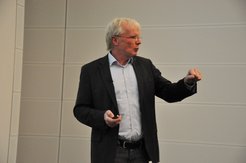Exciting Lecture on the Future of Energy
Many citizens listen to public talk of Prof. Ferdi Schüth
How will mobility, electricity and heating change in the future? Prof. Ferdi Schüth gave an exciting overview for the interested general public. Many citizens of Mülheim came to the institute.

How will our cars be powered in the future? How will we heat our homes and where will our electricity come from? In a public lecture, Prof. Ferdi Schüth, Director at the Max Planck Institut für Kohlenforschung, took a closer look at energy systems that are currently undergoing major changes - and will probably continue to do so in the coming decades. Schüth made clear that mankind is facing many challenges. However, with his positive, optimistic presentation, the chemist also gave hope that we will succeed in overcoming these challenges.
Schüth explained that systems are changing. Many things are being electrified while at the same time CO2 emissions are being reduced. "This is due to the fact that energy we harvest from renewable resources, be it wind or solar, is mainly electric," said the professor.
One challenge is the highly fluctuating supply of wind and solar energy. Schüth said that theoretically, a small fraction of the Sahara desert filled up with solar panels would be sufficient to supply humanity with the energy it needs. "But even in the Sahara, the sun doesn't always shine." And even in particularly windy places in the world, there are lulls. This means that electricity grid operators have to react to peaks as well as to times when there is no power input. "We need intelligent alternatives and storage options." Schüth suggested remunerating power plant operators for keeping their conventional power plants on standby so that lulls could be absorbed. The technology in the field of batteries has also developed strongly in recent years.
Private cars, predicts Schüth, will mainly be battery-powered in the future. However, this does not necessarily apply to freight transport, shipping and air traffic. "The best electric cars can compete with combustion engines in terms of range," says Schüth. However, he highly doubts that a battery-powered Boeing 747 will take off anywhere soon.
Schüth is certain that the problem of high heating costs, which is currently preoccupying many citizens, will no longer be so virulent in the future. "Yes, we have difficult times ahead of us." Nevertheless, thanks to increasingly better-insulated buildings, at some point it will simply no longer be necessary to heat as much as we do now.
Despite all technological developments, Schüth warned that cutting carbon emissions alone would not be enough to stop climate change. "We need negative emissions," he emphasized. This means not only reducing the amount of CO2 entering the atmosphere, but also filtering out the carbon dioxide that is already in the atmosphere.
Around 200 Mülheim citizens followed the entertaining presentation with great interest. Many of them then took the opportunity to talk to scientists from Ferdi Schüth's team about which research projects at the institute are currently dealing with energy issues.
Because the lecture was so well received and there is still great demand, Prof. Ferdi Schüth will hold his lecture again on Thursday, November 16, 6.30 pm. Admission to the event in the lecture hall building of the Max Planck Institut für Kohlenforschung, Lembkestraße 7, is at 6 pm. If you wish to attend, please register in advance: contact@kofo.mpg.de.












